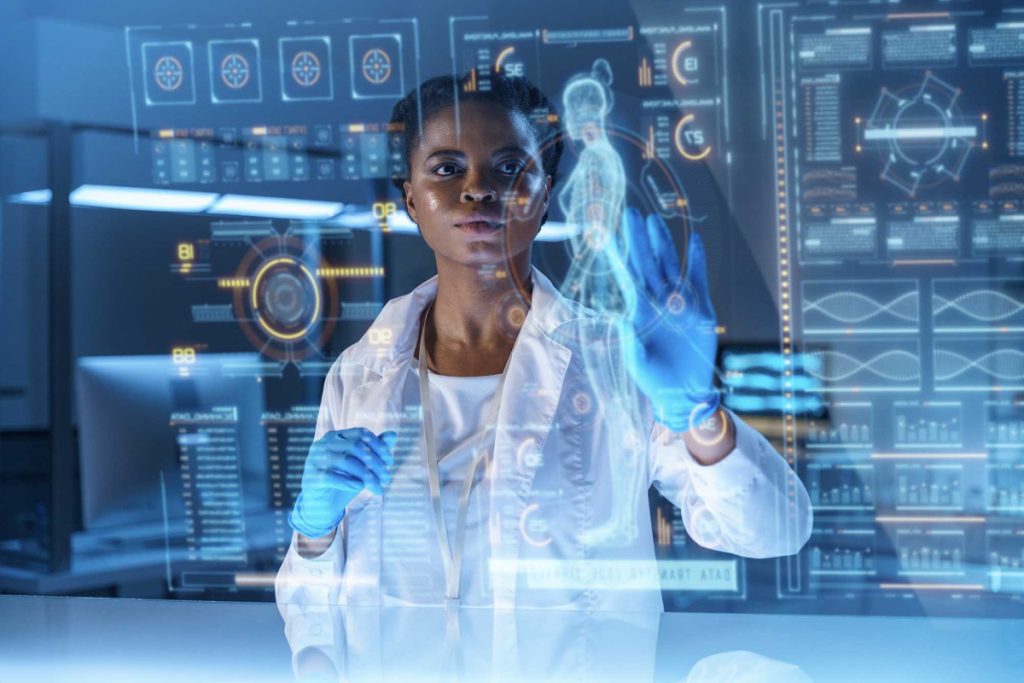
Artificial Intelligence (AI) is changing the world, especially in healthcare. One of the most exciting areas is AI-enhanced diagnostics and medical imaging. This technology is helping doctors find diseases faster and with more accuracy. It is especially useful in places with few doctors, like many parts of Africa.
The Development of AI in Medical Diagnostics
AI in healthcare started with simple programs that could help with decision-making. Over time, it became smarter. Now, AI algorithms can study thousands of medical images, find patterns, and make suggestions that help doctors. With machine learning and deep learning, AI keeps improving the more it is used.
Big companies like Google Health, IBM Watson, and startups like Aidoc and Zebra Medical Vision have created tools that can detect diseases like cancer, pneumonia, and brain injuries. These tools learn from large sets of data, including X-rays, MRIs, and CT scans.
Applications of AI in Diagnostics and Imaging
AI is now used in many hospitals around the world. Some of its main uses include:
- Cancer Detection: AI can find signs of cancer in mammograms and lung scans. It can even find small tumors that doctors might miss.
- Lung and Chest Analysis: During the COVID-19 pandemic, AI helped detect lung infections early. This helped save lives.
- Brain Imaging: AI helps spot strokes and brain injuries quickly, allowing faster treatment.
- Eye Disease Screening: AI can look at images of the eye to find diabetic retinopathy and other eye conditions.
In many cases, AI diagnostic tools can give results in minutes. This is faster than waiting for a radiologist, especially in places with a shortage of skilled doctors.
Global Examples of AI in Healthcare
- The United Kingdom, the National Health Service (NHS) has used AI to speed up cancer diagnoses.
- In the United States, Mayo Clinic and Stanford Hospital use AI for heart and brain imaging.
- In India, AI is being used to screen for eye diseases in rural areas where access to specialists is limited.
These examples show how artificial intelligence in medicine is changing patient care globally.
Africa’s Role and Opportunities in AI Healthcare
Africa faces challenges in healthcare, including a lack of equipment and trained professionals. But this also makes AI a perfect solution for the continent.
- Rwanda: The country has used AI-based tools to screen for tuberculosis using chest X-rays. This has helped detect TB cases early in rural areas.
- Kenya and Nigeria: AI is being tested in hospitals to screen for cervical cancer and malaria.
- South Africa: Universities and hospitals are working with global tech firms to test AI in radiology and medical diagnostics.
Mobile health apps powered by AI are also being used in African communities to provide health advice and remote diagnoses.
Why AI in Diagnostics Matters for Africa
- Faster Results: AI provides quick and accurate results, which helps treat patients faster.
- Remote Access: Many rural areas have no specialists. AI tools can bring expert-level diagnosis to these underserved places.
- Training Support: AI can help train local doctors by showing them how to read medical images and make better decisions.
- Affordable Solutions: While traditional machines are expensive, AI-powered tools on mobile devices are cheaper and more accessible.
Challenges in Implementing AI in African Healthcare
- Data Privacy: Patient information must be protected with proper security and legal frameworks.
- Internet Access: AI tools need internet and electricity, which are still limited in some regions.
- Local Data Training: Most AI is trained on data from outside Africa. Local data is needed to make it more accurate for African patients.
The Future of AI Diagnostics in Africa
With the right investment and support, AI diagnostics can close the healthcare gap in Africa. Governments, tech companies, and health organizations need to work together. Local startups also have a role to play in building AI tools made for African needs.
Training programs, better internet access, and public-private partnerships will make it easier to use AI in remote areas. International partners can support by sharing knowledge and medical technology.
Conclusion
AI-enhanced diagnostics and imaging is not just for rich countries. It can change lives in Africa, where it is needed most. Faster diagnoses, remote access, and training tools mean that more people can get better healthcare.
As Africa adopts AI, the continent has a chance to lead in using smart healthcare technology. With continued growth, AI in African healthcare will become a key part of the future.